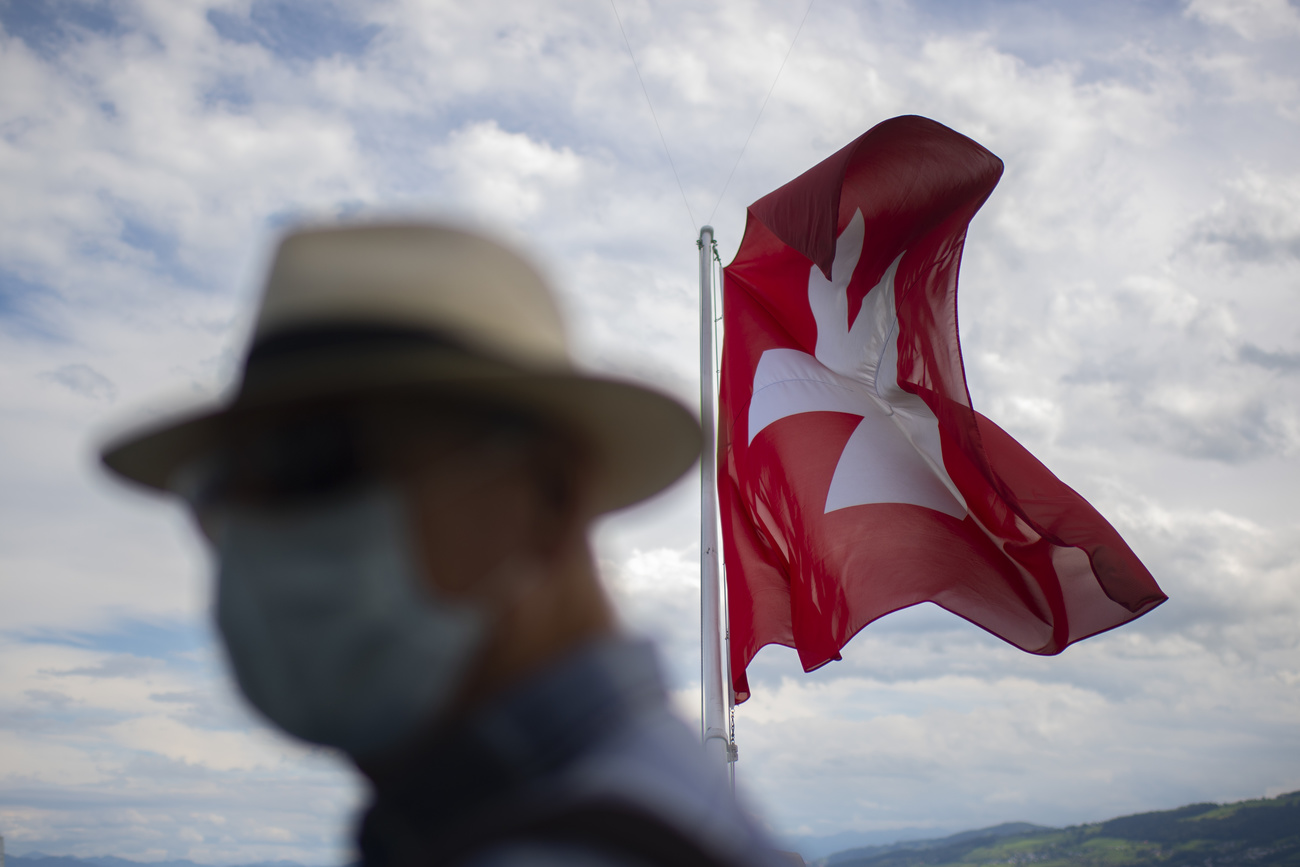
Swiss feel gloomy about Covid-19 situation, poll shows

Swiss residents are feeling increasingly pessimistic about the Covid-19 situation as a second wave of infections hits the country, according to a new survey.
In comparison to a similar coronavirus opinion poll carried out in March, Swiss residents taking part in a recent national online survey say they are more worried about a collapse of the hospital system, the economic situation and also about an increase in social conflicts, isolation and a lack of solidarity.
“The general mood is no longer that the Covid crisis is some kind of adventure but more a burden,” said Michael Hermann of the sotomo research instituteExternal link.
His organisation has been conducting regular online polls gauging public opinion about the government’s handling of the pandemic and the impact on society.
The latest survey, published on Friday, is the fifth of its kind since March and was commissioned by the Swiss Broadcasting Corporation (SBC), swissinfo.ch’s parent company.
The virus situation has deteriorated rapidly in recent weeks. At more than 1,192 cases per 100,000 inhabitants over a 14-day period (figure as of November 6), Switzerland is now one of the hardest-hit countries in the world.

More
Coronavirus: the situation in Switzerland
Asked about personal fears, 55% of respondent voiced concern about restrictions of individual freedoms resulting from Swiss virus measures.
Hermann also noted a growing number of people over the past four months who are worried about social isolation and conflicts in families. The onset of a second wave of infections in October made people anxious about their personal health, the poll revealed.
Upbeat about economy
On the brighter side, Swiss residents are less concerned about the economic situation, the poll found. Hermann said this may be because the country made it through the first lockdown relatively well.
“Overall, the mood has clearly changed for the worse,” he said. “Mistrust, selfishness and aggressiveness seem to brush aside values such as solidarity and friendliness that were mentioned during the first wave of infections in spring this year.”
At the same time, the willingness to help out and to make contact with other people has suffered. The percentage of people prepared to show solidarity is lower than in March, when the government imposed a lockdown shutting down public life for three months.
The researchers found differences between Switzerland’s three language regions and noted that people aged 15-24 appear to struggle more than those over 65.
Trust and self-responsibility
Self-responsibility appears to be of crucial importance for many respondents, according to Hermann.
He said wearing protective masks wherever a minimum distance can’t be respected was generally accepted before the government declared it mandatory.
Hermann pointed out that a narrow majority of respondents is now in favour of introducing short lockdowns to halt the pandemic despite the government and the business community’s stated aim of avoiding so-called ‘circuit breakers’.
Many people are motivated to act in the current stage of the Covid crisis not because of government policy but due to rising figures of infections and hospitalisations, he noted.
“The Swiss population doesn’t wait for government orders,” he said. “But they follow regulations and are willing to adapt accordingly.”
In other words, trust in the government is intact, even though it plummeted between April and October, as shown by the initial results of the sotomo survey, which were published last week.
Only 37% of people surveyed in October had strong or very strong trust in the government’s handling of the crisis. But this rose to 44% within a week after the authorities imposed new restrictions to contain the spread of the virus.
However, this is still a far cry from figures in March when more than 60% of respondents had strong or very strong trust in the government.
Another aspect highlighted in the study is the tendency by respondents to consider Switzerland’s handling of the Covid crisis as superior to other European countries.
Despite a steep increase in infections over the past month, which made Switzerland one of the worst-hit countries, 21% of respondents felt Switzerland was doing much better than the others.
“This is a remnant of Swiss patriotism,” he said. “But the feeling of superiority has been dented since June when Interior Minister Alain Berset proudly said, ‘Switzerland can cope with coronavirus’”.
The online survey polled 42,425 people in Switzerland across all language regions.
It was carried out by the sotomo institute on the behalf of the Swiss Broadcasting Corporations between October 23 to November 2.
The margin of error is +/-1.1%.

In compliance with the JTI standards
More: SWI swissinfo.ch certified by the Journalism Trust Initiative






























You can find an overview of ongoing debates with our journalists here . Please join us!
If you want to start a conversation about a topic raised in this article or want to report factual errors, email us at english@swissinfo.ch.